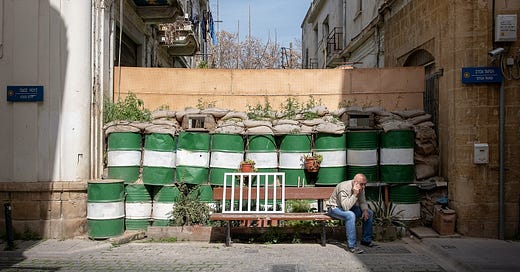Ukraine War Fiction, South Caucasus Unrest, Piñera’s Legacy, and More
This week at Inkstick Media.
Hello, everyone.
In Matt Gallagher’s new novel “Daybreak,” the author takes a hard look at present-day Ukraine and Russia’s war on that country. As Katherine Voyles argues, the novel showcases how fiction is capable of unfolding the events of war as they unfurl.
Across the ocean, Ramona Wadi examines the legacy of Chile’s late right-wing president Sebastián Piñera. In a country with a history of dictatorship, she argues, the outpour of nostalgia for Piñera doesn’t line up with his actual record as a leader.
Meanwhile, journalist Anna Lekas Miller probes the way some types of violence automatically earn the label of terrorism, while others — such as incel and misogynist attacks — have yet to be treated as such.
That’s not all we’ve got at Inkstick. And if you’re not already, please follow us on Twitter, LinkedIn, Threads, Facebook, Instagram, and YouTube.
Here’s what is new this week:
“In Matt Gallagher’s New Novel, ‘Dumb Wars Get Dumb Endings’” by Katherine Voyles (Feb. 20)
The promise of new beginnings seems embedded in the title of Matt Gallagher’s new novel: “Daybreak.” But dawn and the possibilities that emerge at the start of a new day are not the only temporality that structure this story. Resolution, finale, and windings down are also very much part of the novel, even from its very first chapter: “Dumb wars get dumb endings,” one character says to another about the American withdrawal from Afghanistan.
“Why the US Needs Stability in the South Caucasus” by Benyamin Poghosyan and Artin DerSimonian (Feb. 20)
The most significant escalation across the Armenia-Azerbaijan border since the September 2023 military takeover of Nagorno-Karabakh by Azerbaijan occurred on the morning of Feb. 13, leading to the death of four Armenian soldiers. The lingering uncertainty over Armenia-Azerbaijan negotiations and the continuing threat of renewed violence demands US attention and a coherent policy towards the South Caucasus.
“Chile’s Sebastián Piñera: A Legacy of Corruption and Violence” by Ramona Wadi (Feb. 21)
On Feb. 6, Chile’s right-wing former president Sebastián Piñera died of asphyxiation as a result of submersion, after a helicopter he was piloting crashed into a lake at Lago Ranco in the Los Rios region. But his president's demise has prompted a nostalgia that is incompatible with his legacy.
“Should Incel Violence Be Treated as Terrorism?” by Anna Lekas Miller (Feb. 21)
A rise in violence carried out by incels, those who describe themselves as “involuntarily celibate,” highlights the discrepancies in how some types of attackers are considered terrorists, while others aren’t. But should incel attacks and misogynist violence be classified as terrorism?
“Deep Dive: Ideology, Identity, and Welfare in India” by Emily Tamkin (Feb. 22)
In a new study, authors Pushkar Maitra, Sandip Mitra, Dilip Mookherjee, and Sujata Visaria looked at the claim — made for the past decade — that, under the Bharatiya Janata Party (BJP), India’s ruling party, welfare benefits “have become better targeted and less prone to clientelistic control by state and local governments.” But they found that the reasons behind BJP’s widespread support lie elsewhere.
“In Cyprus, Anti-Refugee Hostility Hits a Boiling Point” by Katy Fallon (Feb. 22)
In the early hours of Jan. 5, an explosion erupted outside a refugee nonprofit’s offices in Nicosia, the capital of Cyprus. No one was injured, but the attack badly damaged the building. Meanwhile, the suspected violence highlights a far-right push to intimidate refugees and those working with them.
“The US Should Back the Creation of a Standing Independent Investigative Mechanism” by Colleen Devine (Feb. 23)
A relatively new UN-mandate, the goal of investigative mechanisms generally is to create case files for specific crimes and against named individual perpetrators that build a case which can then be handed off for use in potential criminal trials in national, regional, or international courts or tribunals. The Biden administration should support the advent of a standing independent investigative mechanism.
From the desk of Patrick Strickland, managing editor of Inkstick Media.





